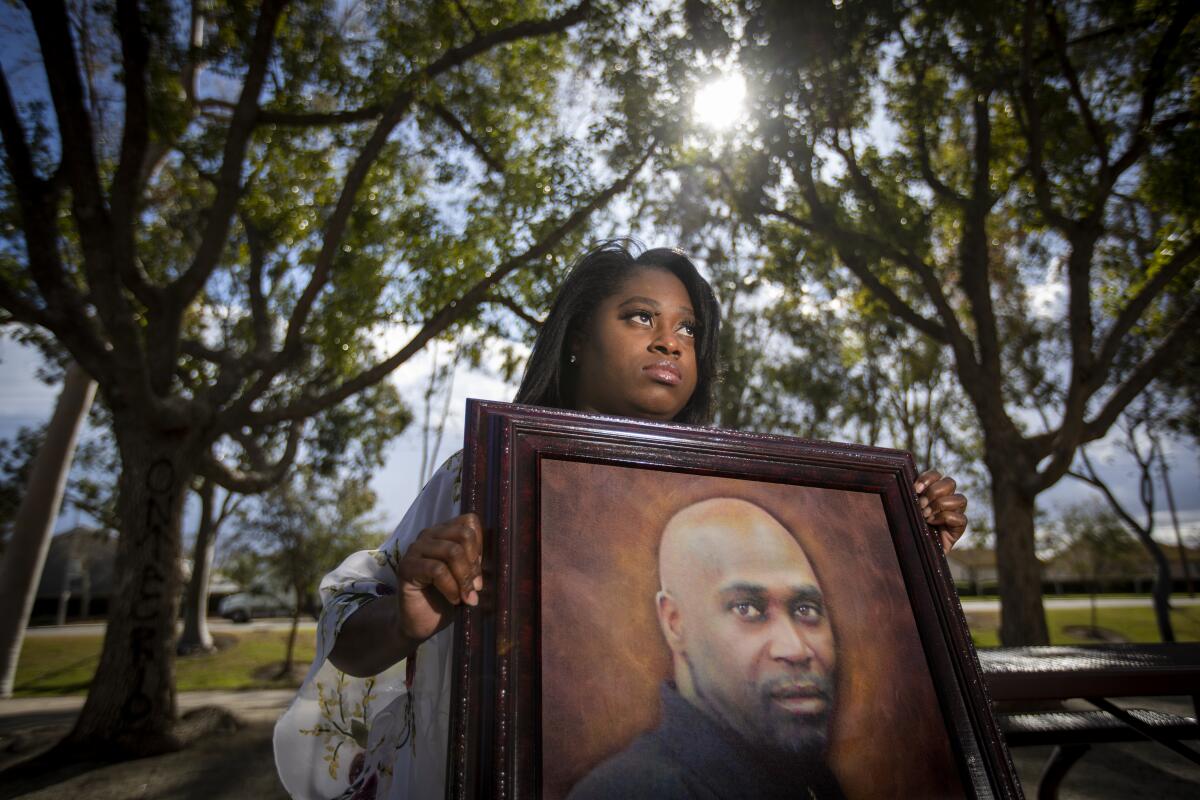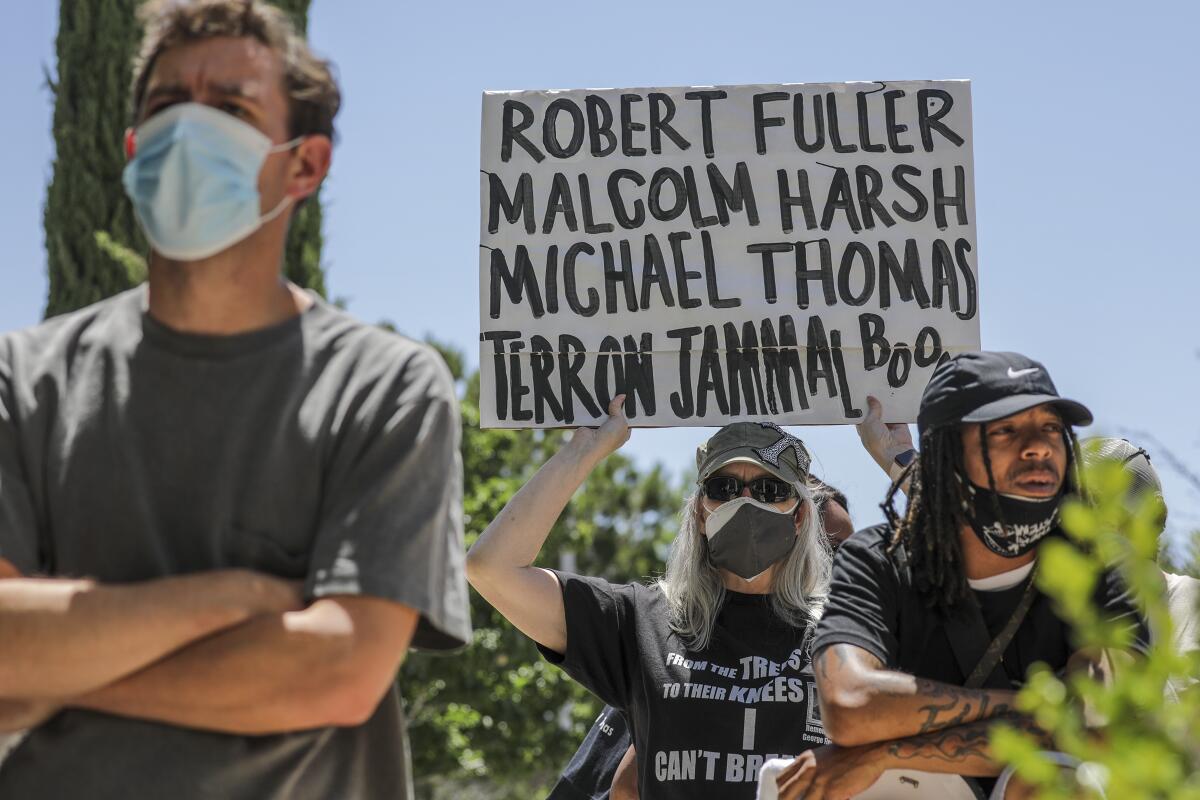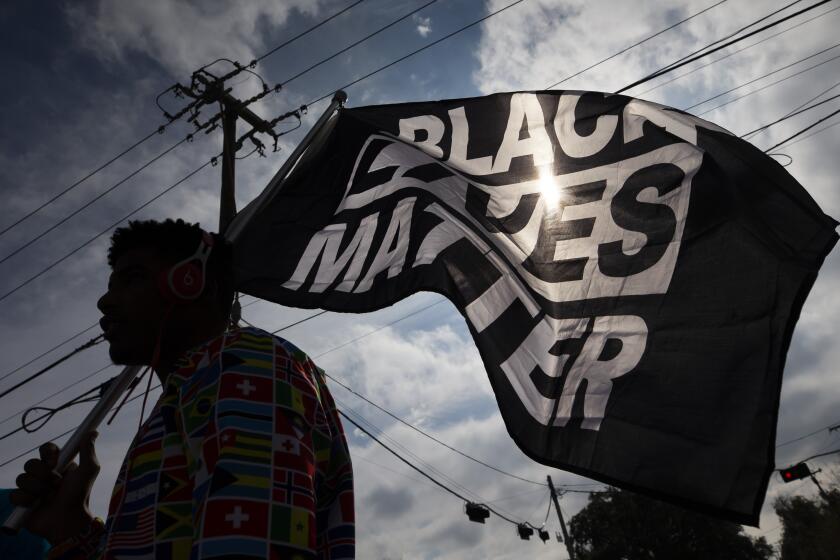Sheriffâs Department reform in Antelope Valley has lagged for years, court monitors say

For months, Myesha Lopez said she was kept in the dark about whether the L.A. County sheriffâs deputy who shot and killed her father in June was still patrolling Lancasterâs streets.
âI plead for months and to no avail,â Lopez said, adding, âI havenât received condolences.â
The silence convinced Lopez that her fatherâs death was a âsenseless act of hate.â Officials say Michael Thomas, a disabled 61-year-old Black man, was fatally shot as he grabbed a deputyâs gun during a struggle at his home, a claim his family disputes. The Sheriffâs Department announced recently that the deputy who shot Thomas has been taken off patrol assignments pending the outcome of an investigation into the killing.
Itâs been almost six years since the Sheriffâs Department agreed to implement sweeping measures to improve policing in the Antelope Valley, after a federal investigation found a pattern of unreasonable force, intimidation, and unlawful stops and searches among Black and Latino residents. But according to monitors overseeing the settlement agreement, progress has been slow, with crucial reforms in areas such as use-of-force policy, community engagement and the handling of public complaints languishing for years.
The Antelope Valley stations, they wrote in their last report, have not adopted a crime prevention strategy based on data and community input. And the department, the monitors added, has failed for years to properly track public complaints that arise during use-of-force investigations, reflecting âongoing lack of management accountability.â
California Atty. Gen. Xavier Becerraâs office says it will look at whether the department has engaged in a pattern of unconstitutional policing.
âItâs not being treated with a sense of urgency thatâs required to move this ahead aggressively,â Joseph Brann, one of two court-appointed monitors and former police chief of Hayward, Calif., told The Times.
The slow pace of change has spurred a campaign led by a coalition of advocacy groups that calls for Lancaster and Palmdale to end their contracts with the Sheriffâs Department and to divert those funds to social services. Organizers of the campaign, which launched Thursday, have not articulated how the region might be policed if the Sheriffâs Department is jettisoned.
Last summer, hundreds demanded transparency from the Sheriffâs Department after the deaths of Thomas and Robert Fuller, a Black man who was found hanging from a tree in neighboring Palmdale in an incident ultimately deemed a suicide.
A 2020 settlement-mandated community survey is indicative of the work ahead. When about 5,800 residents were asked whether deputies in the Antelope Valley treat different groups fairly, 65% of Black respondents said no, compared with 35% of Latino respondents and 22% of white respondents.

Lancaster is the city with the biggest contract with the Sheriffâs Department, paying $28.9 million, while Palmdale has the second biggest, at $27.9 million. The 2015 settlement stems from an investigation in which, among other discriminatory practices, federal officials accused sheriffâs deputies of accompanying county housing agency workers on inspections of Section 8 housing and harassing and facilitating the termination of African American voucher holders from the program.
V. Jesse Smith, co-founder of the Community Action League, which filed a 2011 lawsuit with the NAACP about the abuses, recalled how young Black men would describe being stopped and threatened by deputies.
âOfficers would say, if you donât tell us the truth, we know your parents are in Section 8 and we can get their Section 8 vouchers revoked,â said Smith. âIt was a wild, wild West in the Antelope Valley at the time.â
The Sheriffâs Department and the county Housing Authority ultimately agreed to pay altogether more than $2 million to compensate aggrieved residents.
The settlement, expected to last from 2015 until 2019, required the department to develop policies and training and meet requirements in areas including stops, seizures and searches, bias-free policing, use of force, and data collection.
Black Lives Matter-Los Angeles launched a campaign targeting two police unions, saying they will push to have them disbanded.
Brann said there was a âloss of momentumâ after Alex Villanueva became sheriff in 2018, resulting in a letter the monitors sent him in July that said the department had âyet to produce some of the most significant work required by the [settlement agreement], largely because of a lack of attention and, indeed, a bottleneck of productivity at the executive level.â
The monitors are now more hopeful. Their last progress report recognized the departmentâs moving forward in revising its use-of-force policy and commended it for safeguarding against the type of Section 8 raids that led to the agreement.
âSheriff Villanueva and the involved Department executives acknowledge there is still much to be accomplished in the course of this Settlement Agreement,â department spokesman Lt. John Satterfield said in a statement. âSheriff Villanueva is completely committed to the needed reform to the Department and to enhancing the community engagement activities in order to better serve the community in the Antelope Valley.â
The captains of the Lancaster and Palmdale stations did not respond to interview requests.
âOfficers would say, if you donât tell us the truth, we know your parents are in Section 8 and we can get their Section 8 vouchers revoked. It was a wild, wild West in the Antelope Valley at the time.â
— V. Jesse Smith, co-founder of the Community Action League
Among the monitorsâ greatest concerns is that the department does not effectively use community input and data to guide policing practices.
A mandated study last fall that analyzed stop data in the Antelope Valley from the first six months of 2019 found that 30.3% of Black people who were stopped were searched, compared with 26.3% of whites and 26% of Latinos. The authors said the disparities are largely due to Black people tending to be stopped by deputies who frequently conduct searches during their stops, regardless of race.
Monitors warned that enforcement disparities affect community trust. David Muhammad, executive director of the National Institute for Criminal Justice Reform and part of a team that supports the monitors, said that while the department has improved its outreach, with events such as âCoffee With a Cop,â it hasnât adopted a policing strategy that responds to community concerns.
Dist. Atty. George GascĂłn has requested that law enforcement agencies across L.A. County provide his office with the names of deputies and officers who have histories of misconduct that might affect their credibility in court.
The monitors also flagged lags in improving the handling of personnel complaints and indicated the department has no protocol for investigating racial profiling complaints. They held that the department does not know how many excessive force complaints have been made against its employees.
In a statement, Palmdale Mayor Steve Hofbauer said that areas requiring progress should be addressed, but that he was pleased by improved community engagement.
Lancaster Mayor R. Rex Parris said that he had been opposed to the settlement from the start, calling it âfar too excessive,â but noted that deputies should use better criteria to conduct stops.
âI donât think our problem is necessarily intrinsic racism as it is the failure to recognize the value of people feeling comfortable with police,â he said.
Some community leaders generally agree that the department has improved its engagement with residents but can do more, such as holding sessions where deputies discuss implicit bias with residents of color.
Jacob Johnson, vice president of the NAACPâs Antelope Valley branch, said the stationsâ captains or their liaisons attend monthly NAACP meetings. Kamal Al-Khatib, president of the American Islamic Institute of Antelope Valley and member of the Palmdale stationâs community advisory committee, commended captains for quickly alerting the committee to serious incidents.
For Brian Johnson, a pastor on Lancaster stationâs advisory committee, a pressing concern is transparency around the shooting of Michael Thomas.
The department has said that it responded to Thomasâ home on June 11 after his girlfriend called 911. Officials said she never spoke to the operator, and that arguing and fighting could be heard over the phone.
Officials said when deputies arrived, Thomas refused to open a screen door and that as his girlfriend walked toward the deputies, he assaulted her. Deputies then entered the home and attempted to detain Thomas. During a scuffle, officials said, Thomas grabbed a deputyâs firearm, prompting another to open fire.
Thomasâ six daughters in February filed a wrongful-death lawsuit against L.A. County and Lancaster. It alleges that the 911 call was âaccidental,â that deputies entered Thomasâ home without probable cause that a crime had been committed and states that, within seconds, they began to assault Thomas, placing him in a headlock and twisting his arm when the shooting occurred.
A financial snapshot shared exclusively with the Associated Press shows the Black Lives Matter Global Network Foundation took in just over $90 million last year.
Lopez says her father had a disabled hand and that she âcanât see him being someone who canât be detained.â
The lawsuit holds the city liable for contracting with the Sheriffâs Department after the Department of Justice investigation that led to the settlement agreement. The Sheriffâs Department said it could not comment on the litigation. Lancaster did not return a request for comment.
Lt. Satterfield told The Times that the deputy has been reassigned to non-field duties pending the outcome of criminal and internal investigations. He did not comment on why residents said they had been told the information was confidential.
Lopez belongs to a group of activists who want Lancaster and Palmdale to end their contracts with the department â which both mayors told The Times is not in the cards.
Ayinde Love, 29, recalled being stopped by deputies five years ago after pulling out of his Lancaster home with two friends â on their way to take photographs around town. He said they were given no reason for the stop and that the deputies handcuffed and placed them in the back of a patrol vehicle as they searched his car.
Love said a deputy had asked him about his camera equipment â questioning whether Love could have afforded to buy it himself. After about 30 minutes, they were let go.
The activist never filed a complaint.
âAt that moment, I didnât want anything to do with the police,â he said.
More to Read
Sign up for Essential California
The most important California stories and recommendations in your inbox every morning.
You may occasionally receive promotional content from the Los Angeles Times.












